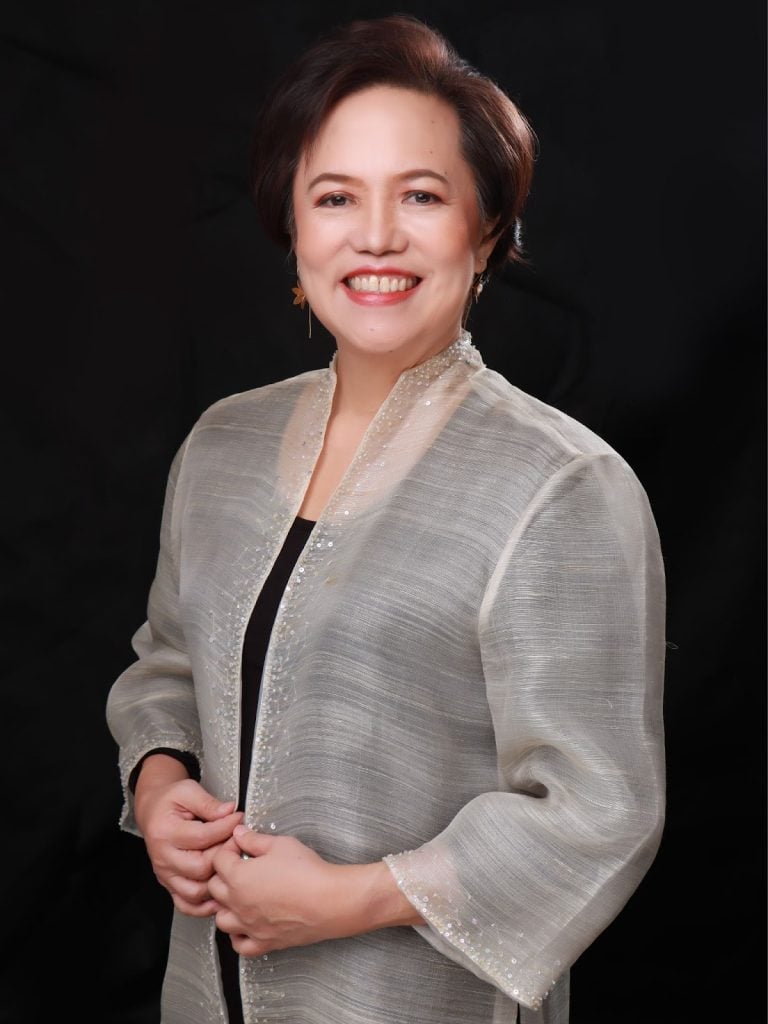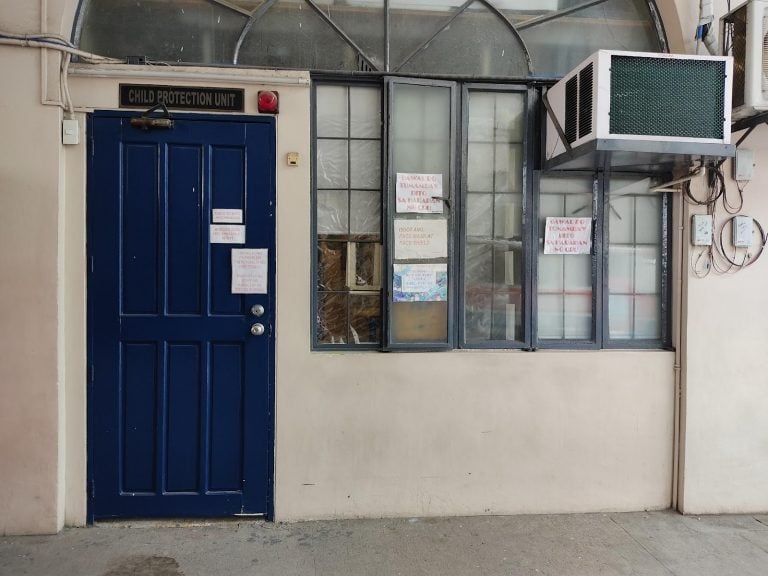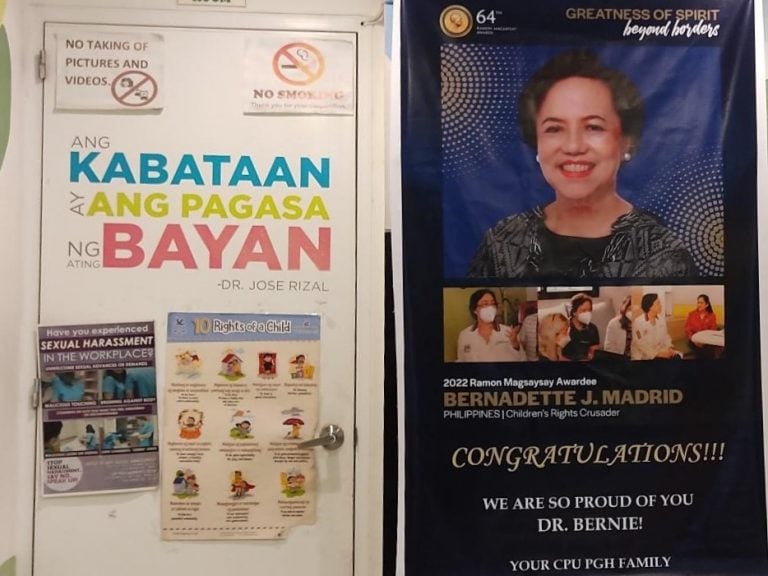 Dr. Bernadette J. Madrid, director of the Philippine General Hospital (PGH) Child Protection Unit (CPU), Clinical Associate Professor at the UP PGH Dept of Pediatrics, and Fellow of the Philippine Pediatrics Society, is one of the recipients of what is considered Asia’s Nobel Prize, the 64th Ramon Magsaysay Awards.
Dr. Bernadette J. Madrid, director of the Philippine General Hospital (PGH) Child Protection Unit (CPU), Clinical Associate Professor at the UP PGH Dept of Pediatrics, and Fellow of the Philippine Pediatrics Society, is one of the recipients of what is considered Asia’s Nobel Prize, the 64th Ramon Magsaysay Awards.
Dr. Madrid, the founding executive director of the Child Protection Network, was awarded for “her admirable commitment in championing the rights of the most vulnerable and integrating child protection services in the health infrastructure.” She is greatly instrumental in the establishment of the PGH CPU which is tasked with capacitating and increasing the number of trained child protection specialists and multi-disciplinary CPUs in the Philippines; and integrating their work all over the country for a comprehensive approach in facing the challenges of child abuse and neglect every day. As of 2021, the PGH CPU has served 27,639 children.
The RM awardee, dubbed as “Children’s Rights and Child Protection Crusader” sees the recognition as “amplifying our work so that we can do more. It raises the consciousness of people to child abuse.”
She went into child protection “because no one was taking care of the abused children at that time.” During her residency at the PGH, child abuse was not a diagnosis– it was not part of their training. During her fellowship training, she saw many abused children but they were not recognized and no services were available to them. The condition was not recognized as a health problem but a social welfare problem; but for Dr. Madrid, it was a health problem.
The RM awardee, dubbed as “Children’s Rights and Child Protection Crusader” sees the recognition as “amplifying our work so that we can do more. It raises the consciousness of people to child abuse.”
Child abuse is common in the Philippines. In a national baseline survey on its prevalence where Dr. Madrid was involved, 80% of Filipino children had experienced at least one form of abuse. Physical abuse was at 66% that translated to 25 million children. Sexual abuse stood at almost 20% or 1 in 5 amounting to at least 600 thousand children. One hospital clinic may not make a dent in the alarming situation–but the 123 Women and Children Protection Units (WCPU) in 61 provinces nationwide today help bridge the gap.
“Our work here is providing comprehensive services for abused children,” Dr. Madrid stated. Since the CPU was created in 1997, she sees how health plays a very big role in the recognition and care of these children. With the children’s gateway to these services dependent on health, work limited solely to health would be incomplete. The multidisciplinary unit then expanded reach into the networks of today. While they are not a center and they do not house children, it remains a place where children can feel safe; they find ways trying to keep children safe. Services focus on the medical, social work, mental health and wellness, legal, judiciary, TeleCPU, and other administrative areas.
Dr. Madrid established several programs and curricula on women and child protection. One of these is the “Women & Child Protection Specialty Training for Physicians, Social Workers, and WCPD Police Officers,” a training program for physicians who conduct child abuse evaluations and give expert testimony in court; as well as social workers and police officers who are part of multidisciplinary teams that provide comprehensive care for abused women and children. The training is part of the overall strategy in the creation of Women and Child Protection Units nationwide. There are now 123 WCPUs in 61 provinces and 10 cities, which have served 119,965 children and adolescents, and 30,912 women. The WCPUs have a total staff of 237 physicians, 199 social workers, and eighty-five police officers.
She has chaired previous regional consultations by the World Health Organization on the WHO World Report on Violence and Health and the Health Sector Response to Sexual Violence. She is a member of the Executive Council of the International Society for the Prevention of Child Abuse and Neglect and Chair of the Asian Forum.

More collaborations
She continues looking into more collaborations because systems require a deep-rooted approach. They help partners in the startup process (i.e. free training, initial equipment, etc.) while living an advocacy of protecting children from abuse and neglect.
CPU has a program with the Department of Education (DepEd) on the prevention of child abuse. After their research in Manila and Iloilo with DepEd on whether they could prevent sexual abuse or the sexual offending behavior of high school students, the proof of concept showed that it is doable. The program with DepEd is currently postponed given that the COVID-19 pandemic adjustments inevitably delayed the scheduling of the next trial stage. While waiting, CPU will run a trial of the concept in Valenzuela City, a path-finding city for ending violence against children. Valenzuela is known for their openness in trying out new programs. Once ready, CPU hopes to scale it nationwide with DepEd.
This coming September 29, CPU is also signing a Memorandum of Agreement with the Integrated Bar of the Philippines (IBP) for a partnership in legal services. The WCPUs will connect with the IBP chapters in their area to avail of free legal counseling.

As CPU’s research showed that universal parenting can decrease child abuse by half, CPU is also partnering with Ateneo de Manila in implementing the findings of the said research. Dr. Madrid laments that a lot of what is child abuse is acceptable as corporal punishment. According to the Adverse Childhood Experiences (ACE) Study, hurting children achieves the opposite effect of what discipline intends to do. It bears long-term consequences that changes a child’s physiology and the wiring of their brain–manifesting as a chronic disease (e.g. hypertension, diabetes) decades, 30 years, or even 50 years later.
Haziel May C. Natorilla and Charmaine Lingdas | Published in UP Manila Healthscape Issue No. 43 (September 2022)
Source: https://www.upm.edu.ph/node/3985
